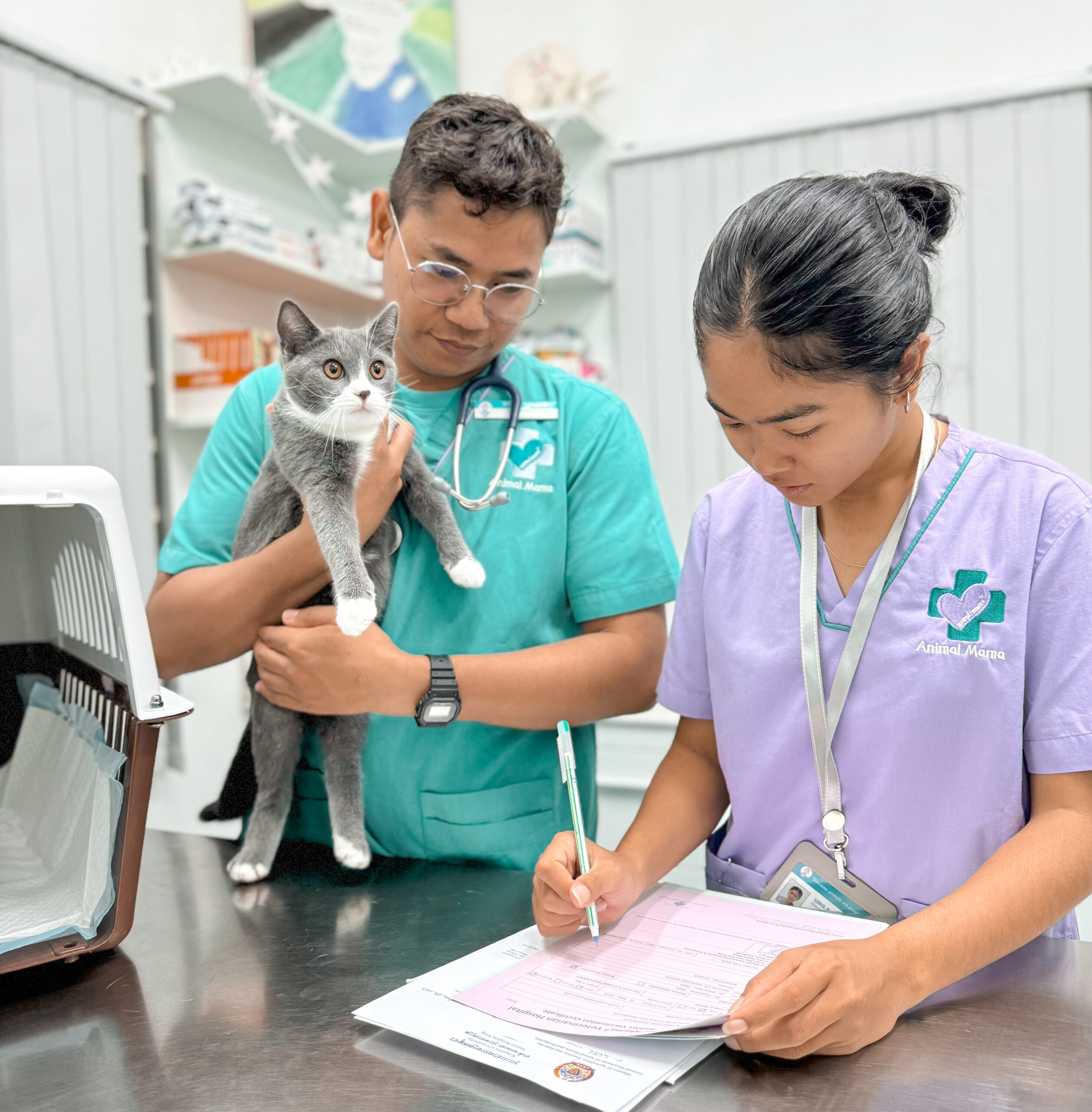Traveling with your pet abroad: what you need to know
Traveling abroad with your pet can be an exciting and rewarding experience, but it also requires careful planning and preparation to ensure a smooth journey. From paperwork to pet-friendly travel arrangements, knowing what to expect is essential. Animal Mama Hospital successfully relocated more than 6,000 pets abroad! We’re here to guide you through the process and provide the veterinary support you need to make your trip stress-free for both you and your pet.

Step-by-step guide to traveling with your pet abroad
1. Research your destination’s requirements
Each country has its own rules and regulations for pet travel. These typically include:
- Vaccination records: Most countries require proof of rabies vaccination and other essential vaccinations.
- Microchip: Many nations require your pet to be microchipped with an ISO-compliant chip.
- Health certificate: A veterinarian-issued certificate, often within 10 days of travel, is usually mandatory.
- Quarantine rules: Some destinations may have quarantine periods for pets, depending on their country of origin.
- Make sure your pet is allowed to fly: Some breeds are restricted from flying or cannot be transferred to the destination due to various reasons.
2. Choose the right travel crate
Airlines and other travel methods often require pets to be transported in approved carriers or crates. Ensure the crate:
- Meets airline and IATA standards.
- Is large enough for your pet to stand, turn, and lie down comfortably.
- Has proper ventilation and secure locks.
3. Book pet-friendly travel arrangements
Whether you’re flying or taking another form of transportation:
- Check the airline or carrier’s pet travel policies.
- Book a direct flight whenever possible to reduce stress.
- Reserve a spot for your pet in advance, as many airlines limit the number of animals per flight.
- Check if your airline allows your pet to travel with you in the cabin and get written approval.
- Check the difference in policies and processes between traveling with a pet in the same aircraft vs. sending the pet separately when you cannot accompany it.
4. Visit your veterinarian
A pre-travel check-up is essential. At Animal Mama Hospital, we offer:
- Comprehensive health assessments to ensure your pet is fit for travel.
- Rabies titers if required by your destination.
- Advice on managing travel anxiety or motion sickness in pets.
- It is well advised to start the preparations at least 6 months in advance
5. Prepare for the trip
- Pack essentials: Include food, water, bowls, leash, waste bags, medication, and copies of documents.
- Label the crate: Clearly mark it with your pet’s name, your contact details, and any special handling instructions.
- Acclimate your pet: Familiarize your pet with the travel crate a few months in advance to reduce anxiety during the trip.
6. Upon arrival
Follow customs regulations at your destination, presenting all necessary documents.
- Monitor your pet for signs of stress or illness after the journey.
- If your pet travels separately from you accompanied by the agent, insist on frequent reports, photos of the pet's face/sides/back and videos in the transit and final destination.
Why choose Animal Mama Hospital?
Traveling abroad with your pet requires careful preparation, and our experienced team at Animal Mama Hospital is here to help. From health checks to providing the necessary certifications, we ensure that you and your pet are travel-ready. With locations in Phnom Penh and Siem Reap, we make it convenient to get the support you need.
At Animal Mama Hospital, we understand that your pets are family. Whether you need help preparing for your journey or ensuring your pet’s health before departure, we’re here for you every step of the way.
FAQ about traveling with pets abroad
- What documents are required for international pet travel?
Typically, you’ll need a rabies vaccination certificate, a health certificate from your veterinarian, import/export certificated (issued by the country’s government) and proof of microchipping. Some countries may require additional tests or documentation.
- How early should I start planning to travel with my pet?
Start planning at least 6 months in advance, as some requirements, like rabies titers, take time to process.
- Can all pets travel by air?
Most airlines allow cats and dogs, but some restrict certain breeds or exotic animals. Always check with the airline beforehand.
- Is sedation recommended for pets during travel?
Sedation is generally not recommended, as it can cause health complications at high altitudes. Instead, consult your veterinarian for safer options to ease travel anxiety.
- What happens if my destination requires quarantine?
If quarantine is necessary, research the facility’s conditions and policies. Ensure your pet has all required vaccinations and documents to minimize the quarantine period. Finally, ensure that you have consistent access to the quarantine facility to be able to check or even visit your pet.
- What if my pet has a medical condition?
Consult your veterinarian before traveling. They may provide a letter explaining your pet’s condition and any necessary medications.
Because Animals Are People Too

